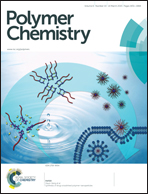Semi-crystalline diblock copolymer nano-objects prepared via RAFT alcoholic dispersion polymerization of stearyl methacrylate†
Abstract
The RAFT dispersion polymerization of stearyl methacrylate (SMA) is conducted in ethanol at 70 °C using a poly(2-(dimethylamino)ethyl methacrylate) [PDMA] chain transfer agent. The growing PSMA block becomes insoluble in ethanol, which leads to polymerization-induced self-assembly (PISA) and hence produces a range of copolymer morphologies depending on the precise PDMAy–PSMAx formulation. More specifically, pure phases corresponding to either spherical nanoparticles, worm-like nanoparticles or vesicles can be prepared as judged by transmission electron microscopy. However, the worm phase space is relatively narrow, so construction of a detailed phase diagram is required for reproducible syntheses of this morphology. Inter-digitation of the stearyl (C18) side-groups leads to a semi-crystalline PSMA core block and the effect of systematically varying the mean degree of polymerization of both the PDMA and PSMA blocks on the Tm and Tc is investigated using differential scanning calorimetry. Finally, it is demonstrated that these cationic nanoparticles can be employed as colloidal templates for the in situ deposition of silica from aqueous solution.


 Please wait while we load your content...
Please wait while we load your content...